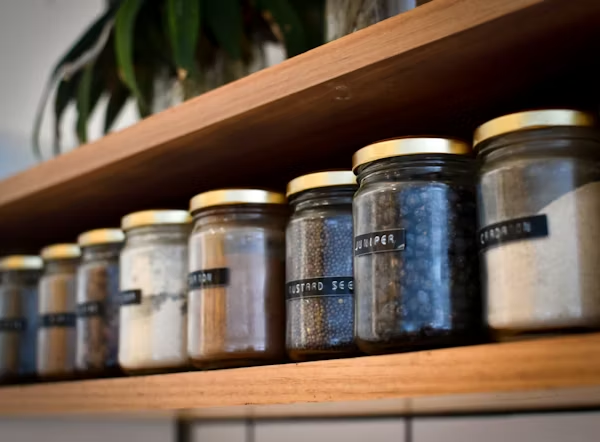Glass Jars: A Complete Guide for B2B Businesses

For B2B firms in food & beverage, cosmetics, and pharma, glass jars are more than simple containers. They are crucial to product safety, operational effectiveness, and brand identity. Glass jars of high quality, of industrial standard, maintains the product quality, and supports glass operations in large quantities without compromising and raising the perceived worth of the goods in the packaging.
Qualifying DAXIN as a supplier allows glass jars to be supplied in bulk and customized for industrial automated systems. ( https://www.daxinglassbottles.com/ar/glass-jars/).). In this article, the focus will be glass jars in a B2B context, including features and benefits, industrial uses, selection criteria and current market trends.
Understanding Glass Jars
Glass jars are containers used to safely store and preserve products while improving marketability and preservation of the product. Understanding the technical specifications is key for improving B2B glass jar production, and improving product presentation.
Material Quality:
Most industrial glass jars are produced using soda-lime glass, borosilicate glass, and other specialty glass products. Specialty glass products are chemically stable, thermally resistant, and mechanically durable. Grade glass minimizes the risk of damaging contents from UV rays, oxidation, and contamination while in storage and during transport.
Design and Customization:
Frosted glass jars can be altered through the addition of tints or colors, metallic coatings, embossed logos, and custom shapes and sizes. B2B companies can improve brand aesthetics, product differentiation and marketing, and packaging cohesion with corporate branding strategies through the added value of customization.
Closure Systems:
Flexible metal closures, screw caps, or snap lids with various sealing systems that prevent leaks, contamination, and spoilage are available on glass jars. Reliable closure systems protect integrity on bulk storage and distribution.
Sustainability:
B2B companies can meet their sustainability fulfillments, environmental compliance, and regulations obligations through reusable and recyclable glass jars. Environmentally friendly packaging consolidates corporate social responsibility and targets the ever-growing eco-conscious markets.
Operational Integration:
Automation in filling, labeling, and packaging processes is achievable through the standardization of dimensions of jars. Such an approach lowers operational — and consequently — B2B costs, improves speed, eliminates errors, and enhances production scale, guaranteeing effectiveness in processes.
Benefits of Glass Jars for B2B Companies
B2B companies will enjoy the perks of industrial quality glass jars, which include:
Product Protection:
The quality and shelf life of products are maintained with glass jars by controlling light, air, and temperature, which are detrimental in product shelf life. Glass jars also prevent contamination, which protects the aroma, taste, and effectiveness of the contents.
Improved Brand Image:
Uniquely shaped custom embossed glass jars with stylish brand finishes help shape perception. B2B ecommerce organizations can develop consumer-friendly, yet still brand focused, premium packaging.
Workflow Improvements:
Designs which can automate and streamline filling, capping and labeling lines means less filled jars per labor hour, less manual work, and fewer mistakes, which is the recipe for increased output and lowered operational expenses.
Easier Compliance:
Buying glass jars from suppliers you trust makes it easier for B2B businesses to comply with international safety, labeling, and local eco-friendly legislation.
Unparalleled Flexibility:
B2B companies can use glass jars to standardize packaging around several product lines to save on inventory, logistics, and operational expenses across the food, drink, cosmetics, pharmacy and luxury gift industries.
Use Cases of Glass Jars for Industrial Purposes
For B2B companies, glass jars can be used in the following ways:
Food Industry:
The jars have innumerable applications in the food industry ranging from spas to honey, beverages to pickles, and more. They do not react with the food components and give an airtight seal to preserve the delicacies safely ensuring active retention of flavor, aroma, and the complete enriching package of the food.
Cosmetics:
The jars not only serve the purpose of beauty packaging but also protect the delicate and active ingredients from air and light which can lead to their rancidity.
Pharmaceuticals and Healthcare
The glass jars are able to safely contain such items as medical ointments, supplements, laboratory reagents, and even herbal extracts. Efficacy and safety are readily apparent when glass jars are used due to their thermal and chemical stability.
Luxury and Promotional Packaging
Promotional and corporate gifts as well as luxe sets are styled and embellished with colored glass jars which have custom finishes, embossed logos and metallics. They increase perceived and brand value.
Wholesale and Distribution
Buyers in bulk are able to buy industrial-grade glass jars because of easier inventory control, reduction of operational difficulties and product consistency. DAXIN and such suppliers charge different fees in accordance with various closure types, shapes and sizes, which all serve to operational simplicity.
Selection Guidelines Number of Glass Jars for B2B Companies
Choosing and selecting glass jars is very important because operational effectiveness and product quality go hand in hand with brand integrity. The main points to consider are;
Material Quality
The glass jars should absorb impact, shock, and temperature changes and should endure chemical reactions and still hold their structure.
Production Capacity
B2B companies require contracts in which large quantities are delivered consecutively without quality reduction to ensure steady flow.
Customization Options
B2B firms use such branding strategies as coloration, embossing, unique shapes, and finished metallics to increase brand recognition and differentiate their works.
Closure and Sealing Solutions:
The inclusion of close systems such as screw caps and snap lids guarantee the products stay undamaged during storage and transportation.
Regulatory Compliance:
Local and international requirements pertaining to the safety, labeling, and the environment must be followed for glass jars.
Shipping and Storage Durability:
Breakage risks are minimized during stacking, handling and transportation as durable jars are less likely to break, reducing operational losses.
DAXIN provides industrial-grade glass jars that satisfy the above criteria, enabling high-volume production, full automation, and compliance with global standards.
Market Trends and Innovations in Glass Jars
The glass jar industry is experiencing evolution driven by technological improvements, sustainability concerns, and market forces:
Sustainable Packaging:
The emphasis on waste reduction and corporate social responsibilities has led B2B companies to adopt eco-friendly, reusable and recyclable glass jars.
Distinctive Branding:
In crowded marketplaces, businesses are able to differentiate themselves through unique shapes as well as frosted, colored, and metallic finishes, and embossed logos.
Automation-Friendly Designs:
Automation in filling, labeling, and capping of jars is made easier as Glass jars designed for automation in these processes improve efficiency, reduce labor costs, and enhance production scalability.
Cross-Industry Applications:
The use of glass jars has extended beyond the food industry to include cosmetics, personal care items, medicines, and even in luxurious gift sets.
Global Supply and Bulk Distribution:
B2B companies focus on suppliers who meet high standards of quality and delivery for bulk, cross-border shipments, supporting dependable supply chains and product uniformity.
Implementing these trends helps B2B firms fine-tune processes, build stronger brand equity, and sustain a competitive edge in different regions.
Conclusion
To B2B businesses, aside from the fact that glass jars are storage containers, they are critically important for product safety, operational effectiveness, and brand visibility. Suppliers, such as https://www.daxinglassbottles.com/ar/glass-jars/, provide industrial-grade, custom-made glass jars that facilitate bulk production, automate processes, and promote sustainability.
Protecting product integrity, streamlining operational processes, and enhancing brand perception on a global scale are potential competitive advantages that B2B businesses stand to gain from investing in premium glass jars.



